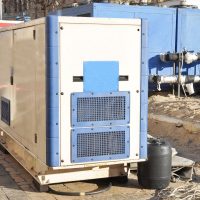Emergency Generator Fuel Tanks & SPCC Plans

For hospitals, businesses, and critical infrastructure, emergency power systems are crucial for maintaining operations during power outages, which can be caused by severe weather or other unforeseen events. Central to these emergency systems are the fuel storage tanks, which must be managed effectively to ensure compliance with environmental regulations. Below we discuss important considerations surrounding Emergency Generator Fuel Tanks and Spill Prevention, Control, and Countermeasure (SPCC) Plans.
Understanding Emergency Generator Fuel Tanks
Emergency generator fuel tanks are essential components of backup power systems, storing the fuel required to operate generators during power outages. These tanks can be installed either aboveground or underground, each with its own set of regulations and maintenance requirements.
Aboveground Storage Tanks (ASTs)
-
Location and Accessibility: Aboveground tanks offer easier accessibility for inspection and maintenance. However, they must be strategically located to minimize risks from external factors like flooding or physical damage.
-
Regulatory Compliance: In New Jersey and Florida, ASTs are subject to state-specific regulations regarding their design, construction, and maintenance to prevent leaks and spills.
Underground Storage Tanks (USTs)
-
Environmental Protection: USTs are favored for their minimal visual impact and lower risk of damage from external factors. However, they pose significant environmental risks if leaks occur.
-
Regulatory Requirements: USTs are heavily regulated, requiring regular inspections, leak detection systems, and adherence to stringent construction standards to prevent contamination.
SPCC Plans: A Crucial Component
The Spill Prevention, Control, and Countermeasure (SPCC) plan is a federal requirement for facilities that store large quantities of petroleum products, including emergency generator fuel tanks. This plan is critical in preventing oil spills and ensuring a swift, effective response should a spill occur.
Key Elements of an SPCC Plan
-
Spill Prevention: Measures to prevent oil spills, such as tank design, secondary containment systems, and regular inspections.
-
Control Measures: Strategies to contain spills, including the use of dikes, berms, or retaining walls.
-
Countermeasures: Procedures for addressing and cleaning up oil spills to minimize environmental impact.
Facilities must adhere to both federal SPCC regulations and state-specific environmental protection laws. This dual compliance ensures a high standard of environmental safety and operational efficiency. New Jersey, for example, requires ASTs to adhere to the Discharge Prevention, Containment, and Countermeasure (DPCC) program, which is even tougher than requirements under the federal SPCC plan.
The Role of Professional Tank Installation and Remediation Services
Professional services specializing in tank installation, removal, and site remediation play a pivotal role in ensuring compliance and environmental safety.
Installation and Removal
-
Expertise in Tank Selection: Professionals guide in selecting the right type of tank (AST or UST) based on operational needs and regulatory requirements.
-
Safe Installation and Removal: Skilled technicians ensure that tanks are installed or removed following state and federal regulations, minimizing risks of leaks and environmental contamination.
Site Remediation
-
Contamination Assessment and Cleanup: In cases of leaks or spills, remediation specialists assess the extent of contamination and implement effective cleanup strategies.
-
Regulatory Compliance: These services ensure that all remediation efforts are in line with state and federal environmental regulations.
Contact Herbert Lutz & Co. for Help With Regulatory Compliance in New Jersey and Florida
For businesses in New Jersey and Florida, complying with SPCC regulations and effectively managing emergency generator fuel tanks is not just a regulatory obligation but a commitment to environmental stewardship. By understanding the intricacies of fuel tank management and the critical role of SPCC plans, companies can ensure uninterrupted operations while upholding environmental safety. Partnering with experienced tank installation, removal, and site remediation professionals can provide the expertise and assurance needed to navigate these complex requirements successfully.
For more information on how to navigate the complex landscape of AST and UST regulations, consult with certified professionals at Herbert Lutz Co., Inc. in New Jersey at 908-862-8888 or Lutz Petroleum in Florida at 954-971-5222. We have the expertise to ensure that your storage tanks meet all federal and state regulations, minimizing risks and maximizing safety.
